Top 15 startup stories of 2022
As we prepare to welcome 2023, here's a look back at the top 15 startup stories featured on YourStory in 2022. These companies have persevered through the ups and downs this year and will inspire you to begin your own entrepreneurial journey.
It was the best of times, it was the worst of times.
If 2020 was the year of COVID-19 and 2021 the year of optimism despite the economic uncertainty, 2022 will likely be remembered as the year of chaos.
This year saw the Russia-Ukraine conflict affecting global economies, recession fears spooking investors, startups facing a funding winter, and companies laying off thousands of workers.
The Indian startup ecosystem saw the emergence of 23 new unicorns this year compared to 44 entrants that entered the coveted $1 billion valuation club last year. Also, after the IPO party of 2021, startups got a reality check in 2022, with many companies pausing their public forays.
Layoffs were a big part of this year's news cycle, with tech giant Meta alone cutting 11,000 jobs. As many as 1.4 lakh employees in tech were laid off in 2022 (as of December 6) across 916 companies. On the other side of the spectrum, hashtags on 'antiwork' and 'quiet quitting' trended as workers sought better work-life balance.
Also, no one could have predicted that Tesla CEO Elon Musk would not only go on to buy Twitter for $44 billion but would also introduce (and then pause) an $8 blue tick subscription plan—a move that would lead to parody accounts flooding the social media site.
To say that cryptocurrency had a disastrous year would be an understatement. First, it was the $40 billion collapse in May of algorithmic stablecoin TerraUSD, followed by crypto hedge fund Three Arrows Capital (3AC) beginning its bankruptcy proceedings in June, and the loss at crypto lender Voyager, which too filed for bankruptcy in July. However, nothing could match the fall of FTX and its founder Sam Bankman-Fried.
From DALL-E 2 and Stable Diffusion to ChatGPT, 2022 was also the year when AI finally went mainstream. One Google engineer, who was later fired, said AI chatbot LaMDA was sentient.
Thanks to NASA’s James Webb Space Telescope, we got some really cool photos of distant space this year. And, a historic Loss and Damage Fund was established to combat the climate crisis.
At YourStory, we had the opportunity to meet, in person this year, the changemakers shaping India. At the 13th edition of TechSparks, Union Finance Minister Nirmala Sitharaman spoke about the country’s revolutionary tech stack.
Tech30
One of the star attractions at YourStory’s TechSparks is its unveiling of Tech30, a specially curated list of India’s 30 most promising startups.
Earlier Tech 30 entrants have been the likes of Freshworks, Chargebee, and Innovaccer which now rank among India's biggest tech companies with a global footprint.
This year’s Tech30 included , , , , , , and . Read the complete list, here.
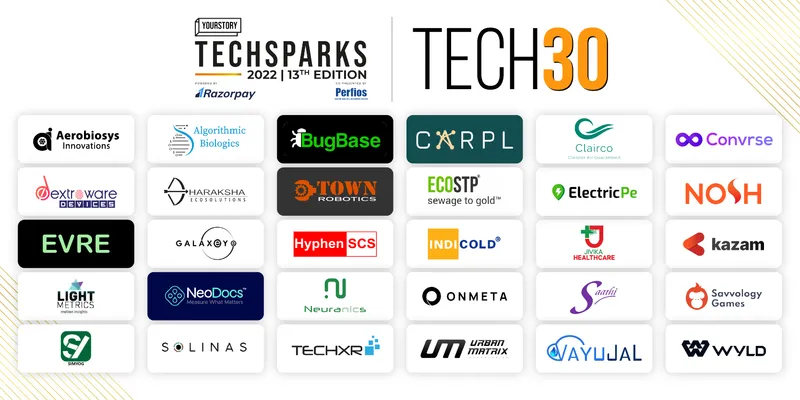
Here are YourStory's 15 most-read startup stories of the year. Their journey in these difficult times will inspire you to chase your entrepreneurial dreams.
Proxgy

Safety helmets developed by Proxgy
Founded in 2020, Gurugram-based B2B (business-to-business) and B2G (business-to-government) startup makes smart helmets.
The startup currently has six patented products and has acquired 25 patents for developing more solutions for industries such as mining, oil and refinery, defence, surveillance, road safety, and others.
Proxgy appeared with its first product on the hit reality TV series Shark Tank India. Presented by Founder Pulkit Ahuja and his investor-partner Inderjit Singh Makkar, the team bagged an investment of Rs 1 crore for 10% equity from former BharatPe MD Ashneer Grover and Lenskart chief Peyush Bansal.
Drife
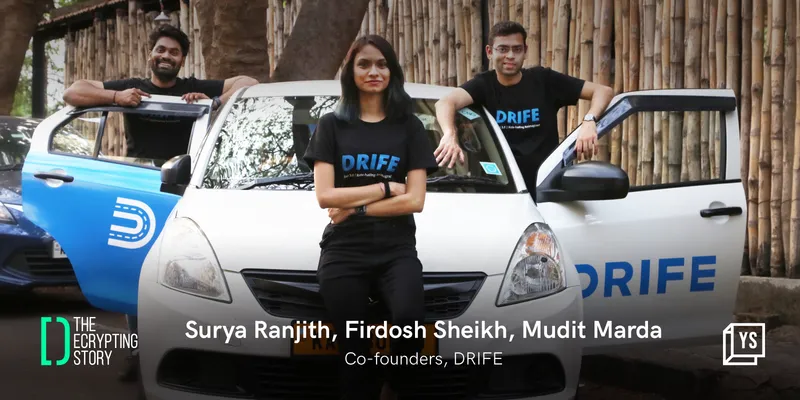
Most of us, at one time or another, have had to deal with ride cancellations and price surges while trying to book a cab.
On the other hand, the likes of Ola and Uber face a different set of challenges, such as rising fuel prices, significant and opaque commissions paid to ride-hailing partner apps, difficulties in making EMI payments, and so on.
Entrepreneur Firdosh Sheikh believes leveraging blockchain technology to tackle the existing challenges is the best way forward.
With the Bengaluru-based blockchain project (founded in 2021), Firdosh and co-founders Surya Ranjith and Mudit Marda are building a ride-hailing experience with zero commission taken from drivers, market-dictated pricing, open governance, and transparency.
Starscapes

It is something special to look at a night sky filled with millions of stars, however, most of us do not have the access to telescopes or even information about astronomy.
is India’s first platform that focusses on “delivering an integrated astronomy experience”. It offers private observatories with professional equipment for observations, astrophotography, and research projects.
The startup has public and private observatories in Kausani and Bhimtal in Uttarakhand, one in Ooty, and a mobile observatory in Jaipur.
Starscapes offers hour-long day and night experiences at its observatories. The day show is priced between Rs 300 and Rs 500, and the night show—the main attraction—is priced between Rs 500 and Rs 800.
Siply

Co-Founders at Siply
Bengaluru-based fintech startup is a micro-savings app that aims to help India’s underserved masses save and invest. It has seen exponential growth in the last eight months, growing its user base by 24X and revenue by 40X.
Founded by Sousthav Chakrabarty and Anil Bhat in 2020, Siply has facilitated 6 million people to either take out microloans worth a cumulative Rs 103 crore or make cumulative investments of over Rs 175 crore.
The startup raised $19 million as part of its Pre-Series A funding round earlier this year led by QI Ventures. It plans to turn operationally cash-flow positive by offering its solutions for specific savings instruments. It is also now looking at acquisitions.
Internshala
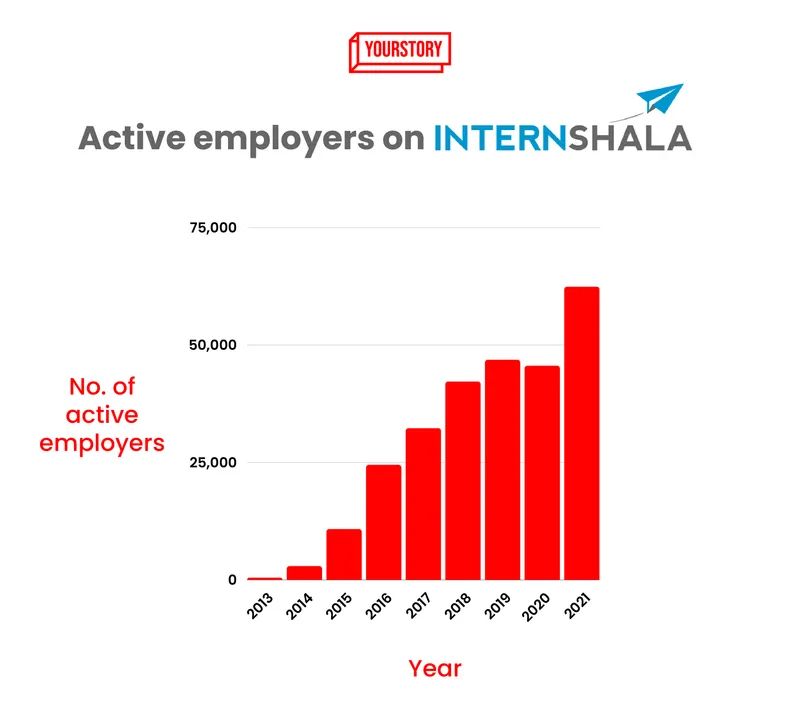
In 2010, Sarvesh Agrawal started started as a blog. Today, it is one of India’s leading internship portals, with services like skill training and a job listing forum.
Since 2016, Internshala has seen more than 4.3 lakh students taking courses that cost between Rs 1,300 and Rs 1,500, and can last anywhere between four and eight weeks. In 2021 alone, about 1.3 lakh students took an Internshala course. Each of the 65 available courses is designed by internal and external experts. They are conducted in cohorts using videos, quizzes, peer grading, and assignments.
The platform currently has 2.2 million active students applying for internships posted by more than 60,000 brands. In FY21, the startup recorded revenue of Rs 20 crore—up 89% from the previous fiscal.
AppyHigh
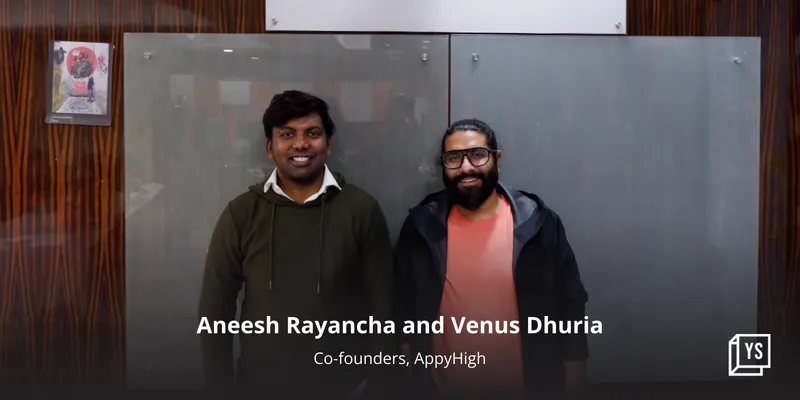
Post the ban on Chinese apps put by India in 2020, Gurugram-based house of apps was among those working to fill the void.
Incorporated by Aneesh Rayancha and Venus Dhuria in 2018, AppyHigh was already in the business of developing utility apps that targeted mass user segments from Tier II cities and beyond.
Between July and September 2020, the company launched Share Karo India, Browser Go, and Scanner Go. These three apps have a total of 136 million downloads as of July 2022, and at least 20 million monthly active users (MAUs).
The founders launched AppyHigh with an initial investment of Rs 5,000 and used the revenue as the seed capital for further growth. In FY21, the company generated a revenue of $8.6 million (Rs 64 crore).
Pmaps

Delhi-based helps companies hire the right person for the role by providing data-driven visual psychometric tests. Its solutions help businesses reduce both time and cost involved in the hiring process, especially for blue-collar workers.
The startup, founded in 2015 by Saurabh Rana and Tarvinder Kaur, offers customised non-technical tests for different sectors and roles. Tarvinder, who built the tech platform, is the business head of the company.
“Many times, candidates are not savvy enough to read English, and it becomes difficult to assess them,” says Saurabh. For blue-collar workers and people who have dropped out of college or school and do not have a great affinity for words, visuals work better, he says.
The startup has more than 50 clients, including Max Life Insurance, Vi, Dish TV, and RBL Bank. It says it has a revenue pipeline of $100,000.
CeraTattva
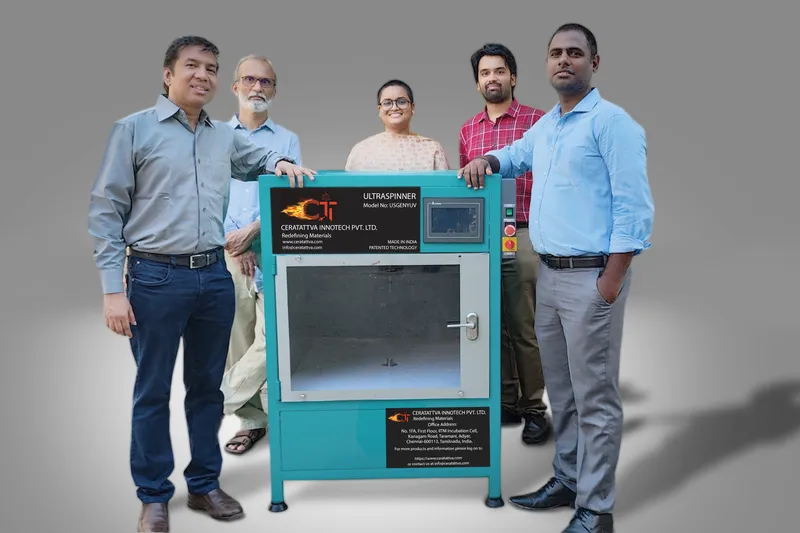
CeraTattva's team
has become the first startup in India with the capability to make preceramic precursors that are both non-silicon and non-oxide-based.
India has been known for efficient and cost-effective space launches but it doesn’t currently have the means to create reusable rockets that come back to earth after doing their job in the sky. CeraTattva has come up with unique formulations that can be used to make advanced ceramics that can withstand extreme conditions.
While CeraTattva—co-founded by Ganesh Babu, Ravi Kumar, Raghunath Sharma and Abha Bharti—is on the verge of producing preceramic precursors on a large scale. It has also successfully produced a machine to produce fibres using centrifugal technology.
The company, which has received a seed amount of Rs 10 lakh from IIT-M Incubation Cell, is looking to raise more funds to set up a facility for large-scale manufacturing of its preceramic precursors.
StepSetGo

StepSetGo app
app provides users with fun incentives to nudge them to invest in their health goals. The platform works on a simple model: users earn SSG coins for every step taken, which can then be redeemed in the in-app marketplace or Bazaar.
Bringing together gamification and fitness to significantly build the app’s user engagement, StepSetGo targets a diverse audience–from students and housewives to corporate honchos to policemen.
Childhood friends Misaal Turakhia, Abhay Pai, and Shivjeet Ghatge, along with former cricketer Zaheer Khan, founded the Mumbai-based startup in January 2019.
The app is one of the 24 winners of the Aatmanirbhar Bharat App Innovation Challenge.
Treflo
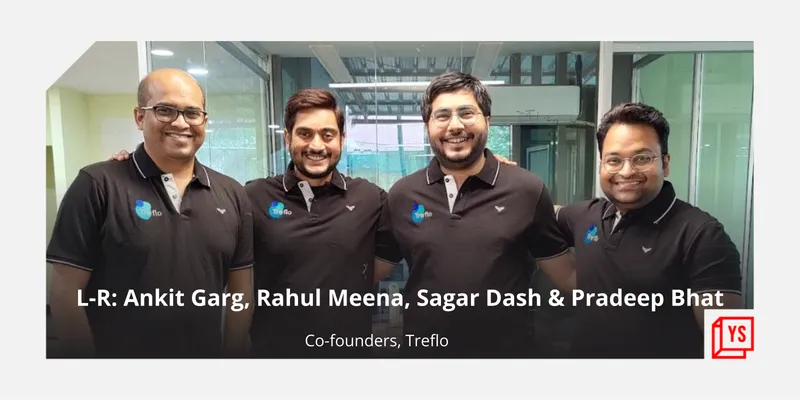
Founded in 2020 in Bengaluru, started as a B2B (business-to-business) marketplace for the trade of electronics and FMCG categories. Here, it saw immediate success, with an annual revenue generation of $2 million.
In January 2021, Treflo set forth in a new direction by focusing on ways to help small and midsize businesses (SMBs) grow and digitise their operations.
From bookkeeping to compliance regulations to payment reconciliation, small businesses often struggle to keep up with the complexities of running a successful enterprise. Treflo helps companies deal with all this and more. Its product suite includes a free GST billing app, an e-way bill generator, and B2B commerce solutions.
HappyLocate
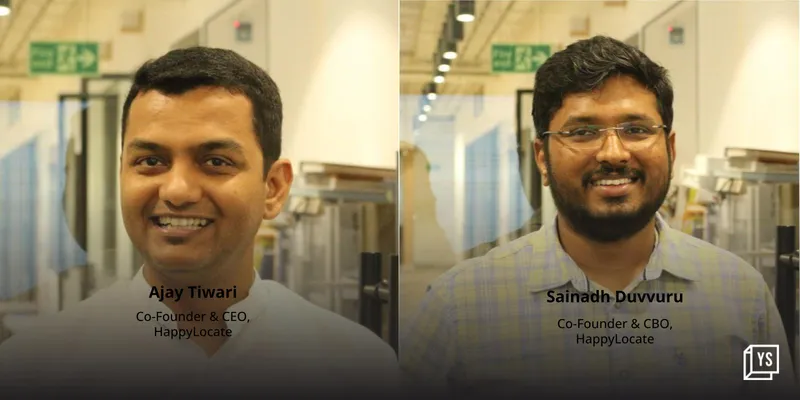
Boxes, bubble wrap, and unending checklists—relocation, especially to another city or country, is stressful, tedious, and time-consuming.
Bengaluru-based has built AI (artificial intelligence) and ML (Machine Learning) tools which provide tailored relocation services based on customer expectations and feedback.
Founded by Ajay Tiwari and Sainadh Duvvuru in 2016, HappyLocate offers employee, household goods, pet, and vehicle relocations as well as asset delivery, and warehousing services.
Up

What if there was a smart appliance that helped you with all your cooking needs? Bengaluru-based consumer hardware startup Up has built a smart connected appliance called DelishUp to people with zero experience in the kitchen to prepare hassle-free, nutritious meals.
“We are making investments towards hardware, software, and cloud technology to deliver superpowers to Indian homes via our connected appliances,” says Mahek Mody, Co-founder and CEO of Up.
DelishUp is a combination of a smart cooking jar that uses pre-sets for cooking tasks, an integrated weighing scale that makes cooking for one to four people easier, and a touch screen that gives access to recipes and helps control the device.
The smart appliance is slated to launch in January 2023 for Rs 24,999, while select early buyers can avail of it for Rs 17,999 through the website. The company expects to sell about up to 1,500 units in the first six months, and hit the 3,000 mark by 18 months. It will be available on ecommerce sites, including Amazon and Flipkart later in the year.
Aupulent
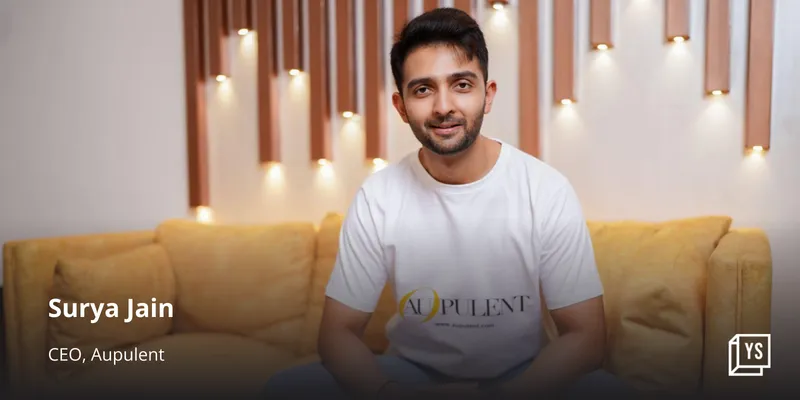
From April 2021 to March 2022, India exported cut and polished diamonds worth $24 billion. Of this, lab-grown diamonds were worth $1.3 billion, according to the Gem and Jewellery Export Promotion Council, growing from $636.43 million from the previous year.
Globally, lab-grown diamonds are emerging as an alternative to natural diamonds. They have been gaining popularity among the younger generation due to their affordable pricing.
This is what drew Surya Jain, a fifth-generation jeweller, to lab-grown diamonds. He had always been looking to create a brand that was affordable, fashionable, and future-ready.
Three years later, in 2021, Surya started along with Abhishek Dak. The Delhi-based startup sells jewellery made from lab-grown diamonds. Surya describes the brand’s products as “budget-friendly”, catering to the needs of the younger generation, who are looking for jewellery for everyday use.
Skill-Lync
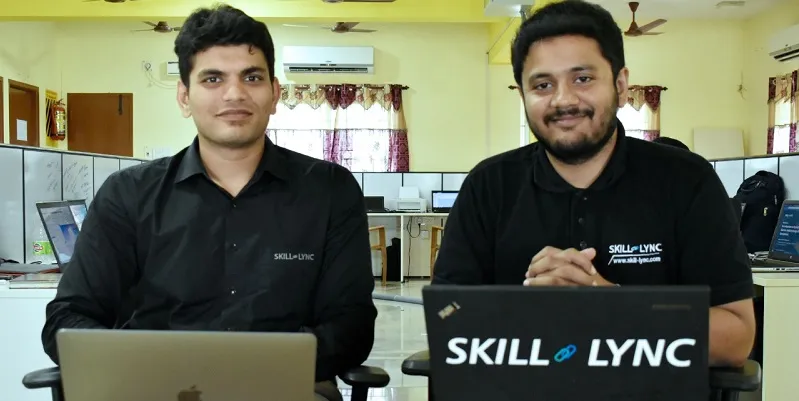
Co-founders Suryanarayanan P (left) and Sarangarajan V
India produces around 15 lakh engineers every year, however, 80% of them lack the necessary skills and are unemployable, according to an Aspiring Minds survey.
Suryanarayanan Paneerselvam (Surya) and Sarangarajan V Iyengar had a first-hand experience of this skill gap when they returned from the US and had to reorient their learning.
This led them to found Chennai-based engineering edtech startup —registered as EpowerX Learning Technologies—in 2018. It leverages technology to equip students with the required technical skillsets to succeed in their respective careers.
The company has witnessed rapid growth, achieving an annual revenue run rate (ARR) of $30 million. In 2021, the edtech startup saw an overall 200% gain in its revenues by doubling its partnerships and placements.
Lugsto

Launched in 2019, is a mobile and website-based platform that helps travellers find safe and affordable “cloakrooms” to stow luggage for a few hours or days.
The Delhi-headquartered company has a network of 160 storage spaces across 40 cities, including Tier I cities like Delhi, Mumbai, and Bengaluru, and Tier II and Tier III cities like Guwahati, Indore, and Lucknow.
“Lugsto’s key clients are people who travel to different cities for work, exams, vacations, etc. and don’t want to book a hotel or a taxi solely for their luggage,” says Co-founder Mukesh Agarwal.
Edited by Kanishk Singh









